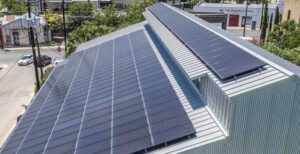These continue to be interesting times for Texas utilities.
With record triple-digit temperatures already blanketing the state, concerns that the grid can keep up with demand are daily headlines. While state leaders assure us that the grid is safe and secure, we’re asked to turn our thermostats up and save those energy-intensive tasks like doing laundry and running dishwashers until later in the evening.
Solar needs to be allowed to play a larger role on the grid for all Texans. The Texas Public Utility Commission is currently seeking public comment about distributed energy resources through Project 51603, and until June 15, you have an opportunity to make your voice heard. Texas Solar Energy Society will certainly be taking that opportunity to share our thoughts with the PUC as it is currently seeking public comment about distributed energy resources (DER) rulemaking.
How to file comments for PUC Project 51603
“After more than 30 years of performance, there is no question that rooftop solar systems have proven their ability to provide energy throughout the year in Texas. Consumers understand this and they want to be part of the solution. Simple and fair rules are needed to support the high interest in continued growth of rooftop solar. This advocacy is exactly the kind of work TXSES is known for,” said Patrice ‘Pete’ Parsons, Executive Director.
Distributed energy resources are small, modular, energy generation and storage technologies that provide electric capacity or energy where you need it, like rooftop solar photovoltaic systems, small wind generators, battery storage and batteries in electric vehicles.
Distributed energy resources can lead to a more reliable and resilient grid. Generation, demand response and energy efficiency can all provide capacity during system peaks, reducing the risk of brownouts and blackouts.

Freedom Solar
In addition, DERs can be used to create microgrids, “islands” with their own generation and storage that can isolate from the larger grid in the event of a system-wide outage. This type of resilience is especially useful in the aftermath of inclement weather events (think Storm Uri) to ensure that power is available to critical infrastructure, like hospitals and other emergency services.
This process will likely result in rulemaking that could change many facets of DERs in Texas, from interconnection to market participation. TXSES board leadership is hard at work preparing comments, urging the PUC to recognize the intrinsic value that DERs have in reducing energy poverty, promoting energy independence and enhancing local reliability and overall grid resilience. Deadline to submit comments is Wednesday, June 15. We’ll post our comments on the TXSES website on Tuesday, June 14.
